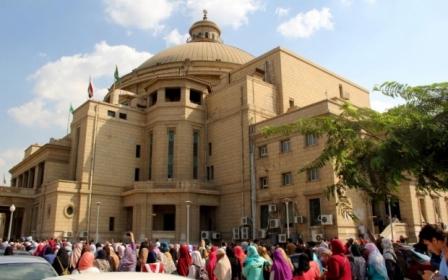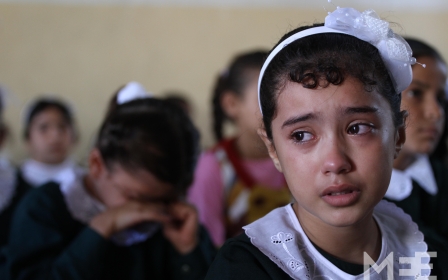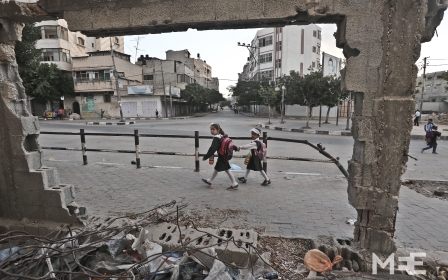Brain-dead Iraq

In the late 20th century, Iraq’s academics and intelligentsia were renowned throughout the world. Even after the calamitous events of the 1990-1991 Gulf War and the subsequent crippling sanctions imposed upon the Iraqi people, Iraqi academics were in demand and readily accepted by international institutions. This tradition of intellectual excellence stretches far back into the history of the lands associated with modern-day Iraq.
Trailblazing philosophers, scientists, mathematicians and jurists have long flourished in "The Land of the Two Rivers," as Iraqis affectionately call their country. Who can forget such intellectual giants such as the ninth-century polymath al-Kindi, and the mathematical genius of al-Khwarizmi to which innovations in algorithms modern technology are indebted. Thank the scholars of Baghdad’s House of Wisdom before you thank Steve Jobs for your iPhone.
For all of his other faults, not least of which pertain to political persecution, torture and disastrous military misadventure in the 1990 Gulf War, Saddam Hussein improved education in Iraq considerably. Saddam made education compulsory for all Iraqi children, all but eradicated illiteracy and made university education not only free (for all Arabs, not just Iraqis), but paid generous scholarships for gifted academics to study at the world’s leading institutions. These academics would then return to their homelands and enrich their own educational institutions to increase their capabilities and research output and to educate the next generation of Iraqi youth.
Saddam’s plans to make a great power out of Iraq had factored in that military capability could only be fully deployed and engaged when sharp minds were pulling the trigger. This goes some way into explaining why Iraqi university students were drafted in enormous numbers into the Iraqi Republican Guard in the closing years of the Iran-Iraq War.
Recognising this rich intellectual heritage is arguably crucial for the revitalisation of Iraq following George Bush and Tony Blair’s crusade to destroy the country in 2003.
However, the current generation of Iraqi academics and researchers are facing an uphill battle. The invasion burned through what was left of the infrastructure, security and economy that is necessary for an education system to flourish. Indeed, it became a grim and recognised feature of the Iraqi education environment for academics to expect to be targeted for assassination and kidnapped by gangsters with guns and badges.
It is unsurprising that aspiring academics would thus seek to study in universities abroad where their professors could be relied upon to turn up in class, not in the local newspaper’s obituary. People should not be fooled by stories of economic growth either. That “growth” was pocketed by Iraq’s corrupt political elite, whilst the working and middle classes saw no such benefit. The anti-corruption protests still ongoing in Iraq are a testament to how much the normal Iraqi citizen is being squeezed.
That said, those lucky enough to get scholarships for postgraduate studies abroad were given stipends of $20,300 a year (as a point of comparison, British PhD students normally receive approximately £14,000 - $21,600 a year). This was supplemented with additional annual income if the student was married and had children, with a spouse attracting approximately $14,000 and up to $6,600 for two children (any additional children would be at the student’s own expense). For a small family of four, that would effectively mean an annual income of some $40,000 - a tidy sum, as I am certain any student would agree.
However, since the beginning of the Iraqi government’s war against the so-called Islamic State (IS), academic and intellectual advancement are expendable once more. The war is not going well for the Iraqi government and its allied Shia Popular Mobilisation Units (PMU), and is clearly costing them a lot of money. To save money, the Iraqi government, in a show of absolute sectarianism, has on several occasions failed to pay government-aligned Sunni fighters for months. Further cuts have been made that have specifically hit students since the election of Haidar al-Abadi to the country’s most powerful position, and his appointment of Hussein al-Shahristani to the position of Minister of Higher Education.
In contrast with the previous figures detailed above, since late 2014 all allowances granted for children have been axed along with a third of the allowance granted for spouses. Moreover, Iraqi government rules for postgraduate students have changed, even for current students. Before, students were entitled to study for four years, with an understanding that any time spent on scholarships will have to be “paid back” to the government by serving in an Iraqi university as a lecturer for a period equalling double whatever time spent abroad. As such, four years on a scholarship will therefore equal eight years of service and so forth.
However, now the Iraqi government has capped the years spent abroad on a scholarship to three years only, with any additional years being entirely at the student’s expense. As previously stated, this rule has been applied to all students, even current ones.
These actions by the Iraqi government have led to student demonstrations outside the Iraqi Embassy in London (poorly covered by international media). The students have protested twice this year alone, first in March and most recently just last month when 200 Iraqis demonstrated for two hours before the Iraqi Educational Attaché agreed to deliver a list of demands to restore the students’ stipends to the Iraqi government.
Speaking to me privately, several Iraqi students in Britain have told me of their woes. Ayad (a pseudonym), studying for a PhD in engineering, told me that he had to now rush through his thesis. “The Iraqi government told us that we had to finish our work in three years, irrespective of when we started,” he said. “How am I supposed to finish over a year’s work in a few months?”
Another student, Aziz (also a pseudonym), told me that the shortage of funds had made his life extremely difficult. “I have a wife and three kids. I was already paying for one completely on my own, and now my expenses have increased threefold.” Aziz was essentially forced to take a £7,500 pay cut suddenly, with no grace period offered.
Needless to say, the only thing that all this achieves is to discourage Iraq’s best and brightest from even bothering to pursue academic studies that will eventually enrich and strengthen the country, and perhaps go some way in healing the rifts that have surfaced since 2003.
Rather than al-Abadi focusing on cleaning the corruption that is rife within the Iraqi state institutions and is pervasive throughout all government ministries (who can forget Iraq’s “ghost soldiers”, after all?), al-Abadi is instead trying to scrape together the cash to fill his war chest by targeting those who lack the power to seriously challenge him.
Iraq’s hyper-sectarianism, corruption and deadly insecurity are creating a very hostile environment that precludes the production of any future al-Kindi or al-Khwarizmi, and is inducing a horrific brain drain. Indeed, the future of Iraq is likely to be a brain dead one if the current trends continue.
- Tallha Abdulrazaq is a researcher at the University of Exeter's Strategy & Security Institute, and winner of the Al Jazeera Young Researcher Award. He blogs at thewarjournal.co.uk and tweets from @thewarjournal
The views expressed in this article belong to the author and do not necessarily reflect the editorial policy of Middle East Eye.
Photo: Red traces of anti-aircraft machine gun fire soar across Baghdad's skyline near the Al Shawi mosque in Baghdad (AFP)
New MEE newsletter: Jerusalem Dispatch
Sign up to get the latest insights and analysis on Israel-Palestine, alongside Turkey Unpacked and other MEE newsletters
Middle East Eye delivers independent and unrivalled coverage and analysis of the Middle East, North Africa and beyond. To learn more about republishing this content and the associated fees, please fill out this form. More about MEE can be found here.





